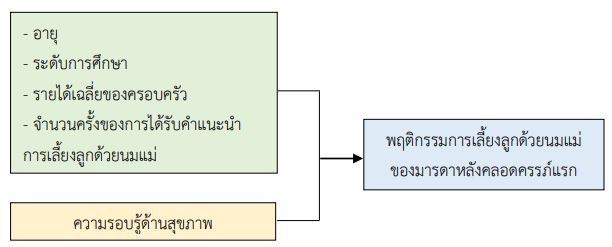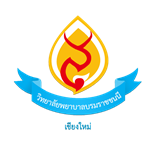Factors Influencing Breastfeeding Behaviors Among First-Time Postpartum Mothers in Chiang Mai Province
Keywords:
Factors, Health Literacy, Breastfeeding Behaviors, First-Time Postpartum MothersAbstract
This predictive research aimed to examine the factors influencing breastfeeding behavior among first-time postpartum mothers in Chiang Mai Province. The sample consisted of 100 first-time postpartum mothers from Chiang Mai. The research instruments included questionnaires on general information, health literacy, and breastfeeding behavior. Data were analyzed using descriptive statistics, Pearson’s correlation coefficient, and stepwise multiple regression analysis.
The research findings revealed that educational level, the frequency of breastfeeding advice received, and health literacy were positively correlated with breastfeeding behavior (r = 0.23, r = 0.33, p-value < 0.05; and r = 0.52, p-value < 0.01, respectively). Among the factors predicting breastfeeding behavior in first-time postpartum mothers, the frequency of breastfeeding advice and health literacy together accounted for 33.80% of the variance (R² = 0.38, p-value < 0.01). Therefore, nurses and healthcare professionals should organize activities to enhance health literacy across all dimensions and establish a system for providing both individual and group breastfeeding advice at least twice, starting during pregnancy. Additionally, relevant factors should be incorporated into the development of breastfeeding promotion programs to support first-time postpartum mothers in achieving successful breastfeeding.
References
กรมอนามัย. (2561). แผนยุทธศาสตร์ กรมอนามัย พ.ศ. 2553-2556. กรุงเทพฯ: สามเจริญพาณิชย์.
ณัฏพรรณ โภคบุตร. (2559). การศึกษาปัจจัยที่มีความสัมพันธ์กับพฤติกรรมการเลี้ยงลูกด้วยนมแม่ และพฤติกรรมการให้อาหารเสริมทดแทนนมแม่. สารนิพนธ์ปริญญาการจัดการมหาบัณฑิต วิทยาลัยการจัดการบัณฑิตวิทยาลัย มหาวิทยาลัยมหิดล.
บุญใจ ศรีสถิตนรากูร. (2550). ระเบียบวิธีวิจัยทางพยาบาลศาสตร์. (พิมพ์ครั้งที่ 4). กรุงเทพฯ: โรงพิมพ์จุฬาลงกรณ์มหาวิทยาลัย.
บุญศรี จันทร์เพ็ญ. (2567). ปัจจัยที่มีความสัมพันธ์กับพฤติกรรมการเลี้ยงลูกด้วยนมแม่ของสตรีที่นําลูกมาเข้ารับบริการในโรงพยาบาลบางขัน จังหวัดนครศรีธรรมราช. วารสารวิชาการเพื่อการพัฒนาระบบสุขภาพปฐมภูมิและสาธารณสุข, 2(3), 16-30.
ปริยชาต วัฒนศิริ, บังอร ศุภวิทิตพัฒนา และพรรณพิไล ศรีอาภรณ์. (2565).ความรอบรู้ด้านสุขภาพและการจัดการตนเองในการเลี้ยงบุตรด้วยนมแม่อย่างเดียวของมารดาที่มีบุตรคนแรก. วารสารวิทยาลัยพยาบาลพระปกเกล้า จันทบุรี, 33(2), 1-12.
พิชญ์ศุภากาณต์ ไต่เมฆ. (2561). ความสัมพันธ์ระหว่างความรอบรู้ด้านสุขภาพกับพฤติกรรมสร้างเสริมสุขภาพ ของมารดาหลังคลอดในโรงพยาบาลศูนย์การแพทย์สมเด็จพระเทพรัตนราชสุดาฯ สยามบรมราชกุมารี. วิทยานิพนธ์ปริญญาสาธารณสุขศาสตรมหาบัณฑิต วิชาเอกการจัดการสร้างเสริมสุขภาพ บัณฑิตวิทยาลัย มหาวิทยาลัยธรรมศาสตร์.
ภัทรพร ชูประพันธ์, วีณา เที่ยงธรรม และปาหนัน พิชยภิญโญ. (2557). ปัจจัยที่มีอิทธิพลต่อการเลี้ยงลูกด้วยนมแม่อย่างเดียว 6 เดือน ของแม่ในเขตภาคกลางตอนล่าง. ขอนแก่น: มหาวิทยาลัยขอนแก่น.
มาลีวัล เลิศสาครศิริ และสาลี่ แซ่เบ๊. (2561). ความสัมพันธ์ระหว่างการรับรู้สมรรถนะของตนเองความรู้สึกมีคุณค่าในตัวเองและเจตคติต่อการเลี้ยงลูกด้วยนมแม่กับพฤติกรรมการเลี้ยงลูกด้วยนมแม่ของมารดาวัยรุ่นหลังคลอดครรภ์แรก. วารสารการพยาบาลและการศึกษา, 11(3), 10-21.
ลักขณา ไชยนอก.(2558). รายงานวิจัยเรื่องปัจจัยที่มีอิทธิพลต่อพฤติกรรมการเลี้ยงลูกด้วยนมแม่ของมารดาวัยรุ่นหลังคลอดในโรงพยาบาลมหาราชนครราชสีมา. สำนักวิชาพยาบาลศาสตร์ มหาวิทยาลัยเทคโนโลยีสุรนารี.
วชิระ เพ็งจันทร์. (2560). ความรอบรู้ด้านสุขภาพ. ใน เอกสารการประชุมเชิงปฏิบัติการพัฒนาศักยภาพบุคลากรกรมอนามัย เรื่อง ความรอบรู้สุขภาพมุ่งสู่ประเทศไทย, กรมอนามัย กระทรวงสาธารณสุข. นนทบุรี: กระทรวงสาธารณสุข.
สมพงษ์ ชัยโอภานนท์. (2559). ปัจจัยที่มีผลต่อการเลี้ยงลูกด้วยนมแม่อย่างเดียว 6 เดือนในจังหวัดนนทบุรี.วารสารสมาคมเวชศาสตร์ป้องกันแห่งประเทศไทย, 6(2), 97-108.
สำนักงานสถิติแห่งชาติ. (2566). รายงานผลฉบับสมบูรณ์โครงการสำรวจสถานการณ์เด็กและสตรีในประเทศไทยพ.ศ. 2565. กรุงเทพฯ: สำนักงานสถิติแห่งชาติ ประเทศไทย.
สำนักงานสถิติแห่งชาติ. (2562).รายงานผลฉบับสมบูรณ์. โครงการสำรวจสถานการณ์เด็กและสตรีในประเทศไทยพ.ศ. 2562. กรุงเทพฯ: สำนักงานสถิติแห่งชาติ ประเทศไทย.
อังศินันท์ อินทรกำแหง (2560). การสร้างและพัฒนาเครื่องมือความรอบรู้ด้านสุขภาพของคนไทย. รายงานวิจัยฉบับสมบูรณ์. สถาบันวิจัยพฤติกรรมศาสตร์ มหาวิทยาลัยศรีนครินทรวิโรฒ.
Aljassim, N., & Ostini, R. (2020). Health literacy in rural and urban populations: A systematic review. Patient Education and Counseling, 103(10), 2142-2154. https://doi.org/10.1016/j.pec.2020.06.007
Asimaki, E, Dagla, M., Sarantaki, A, & Iliadou, M. (2022). Main biopsychosocial factors influencing breastfeeding: A systematic review. Maedica, 17(4), 955-962. https://doi.org/10.26574/maedica.2022.17.4.955
Batterham, R. W., Hawkins, M., Collins, P. A., Buchbinder, R., & Osborne, R. H. (2016). Health literacy: Applying current concepts to improve health services and reduce health inequalities. Public Health, 132, 3-12. https://doi.org/10.1016/j.puhe.2016.01.001
Best, J. W. (1977). Research in Education. (3rd edition). New Jersey: Prentice Hall, Inc.
Chowdhury, R., et al. (2015). Breastfeeding and Maternal Health Outcomes: A systematic review and meta-analysis. Retrieved July 29, 2024 from https://pubmed.ncbi.nlm.nih.gov/26172878.
Degefa, N., et al. (2019). Breast feeding practice: positioning and attachment during breast feeding among lactating mothers visiting health facility in Areka Town, Southern Ethiopia. Retrieved May 31, 2024 from https://pubmed.ncbi.nlm.nih.gov/31080479/.
El Shafei, A. M., & Labib, J. R. (2014). Determinants of exclusive breastfeeding and introduction of complementary foods in rural Egyptian communities. Global Journal of Health Science, 6(4), 236-244. https://doi.org/10.5539/gjhs.v6n4p236
Hoseini, F., Rasekhi, A., & Lamyian Myandoab, M. (2020). Investigating the relationship between exclusive breast-feeding and health literacy in primiparous women. Daneshvar Medicine, 26(4), 31-36.
Kim, S. K., Park, S., Oh, J., Kim, J., & Ahn, S. (2018). Interventions promoting exclusive breastfeeding up to six months after birth: A systematic review and meta-analysis of randomized controlled trials. International Journal of Nursing Studies, 80, 94-105. https://doi.org/10.1016/j.ijnurstu.2018.01.004
Liu, C., et al. (2020). What is the meaning of health literacy? A systematic review and qualitative synthesis. Family Medicine and Community health, 8(2), e000351. https://doi.org/10.1136/fmch-2020-000351
Peñacoba, C., & Catala, P. (2019). Associations between breastfeeding and mother-infant relationships: A systematic review. Breastfeeding Medicine: The Official Journal of the Academy of Breastfeeding Medicine, 14(9), 616-629. https://doi.org/10.1089/bfm.2019.0106
Rafizadeh, R., Heidari, Z., Karimy, M., Zamani-Alavijeh, F., & Araban, M. (2019). Factors affecting breast-feeding practice among a sample of Iranian women: A structural equation modeling approach. Italian Journal of Pediatrics, 45(1), 1-8. https://doi.org/10.1186/s13052-019-0724-9
Rohini, A. M., Elavally, S., & Saradakutty, G. (2022). Effectiveness of breastfeeding education compared to standard hospital information on exclusive breastfeeding among mothers: A systematic review. Journal of Education and Health Promotion, 11, 125. https://doi.org/10.4103/jehp.jehp_708_21
Santana, G. S., Giugliani, E. R. J., Vieira, T. O., & Vieira, G. O. (2018). Factors associated with breastfeeding maintenance for 12 months or more: A systematic review. Jornal de Pediatria, 94(2), 104-122. https://doi.org/10.1016/j.jped.2017.06.013
Schroeder, M. A. (1990). Diagnosing and dealing with multicollinearity. Western Journal of Nursing Research, 12(2), 175-187. https://doi.org/10.1177/019394599001200204
Smith, J. A., & Johnson, L. M. (2021). The impact of childbirth on women's long-term health: A comprehensive review. Obstetrics & Gynecology, 137(3), 458-469.
Temple Newhook, J., et al. (2017). Poverty and breastfeeding: Comparing determinants of early breastfeeding cessation incidence in socioeconomically marginalized and privileged populations in the final study. Health Equity, 1(1), 96-102. https://doi.org/10.1089/heq.2016.0028
Valero-Chillerón, M. J., et al. (2022). Influence of health literacy on maintenance of exclusive breastfeeding at 6 months postpartum: A multicentre study. International Journal of Environmental Research and Public Health, 19(9), 5411. https://doi.org/10.3390/ijerph19095411
Victora, C. G., et al. (2015). Association between breastfeeding and intelligence, educational attainment, and income at 30 years of age: A prospective birth cohort study from Brazil. The Lancet. Global Health, 3(4), e199-e205. https://doi.org/10.1016/S2214-109X(15)70002-1
World Health Organization. (2023). Infant and young child feeding. Retrieved March 29, 2024 from https://www.who.int/news-room/fact-sheets/detail/infant-and-young-child-feeding.

Downloads
Published
How to Cite
Issue
Section
License
Copyright (c) 2024 Journal of Nursing and Public Health Research

This work is licensed under a Creative Commons Attribution-NonCommercial-NoDerivatives 4.0 International License.
1. บทความหรือข้อคิดเห็นใด ๆ ที่ปรากฏในวารสารวิจัยการพยาบาลและการสาธารณสุข ที่เป็นวรรณกรรมของผู้เขียน บรรณาธิการไม่จำเป็นต้องเห็นด้วย
2. บทความที่ได้รับการตีพิมพ์ถือเป็นลิขสิทธิ์ของ วารสารวิจัยการพยาบาลและการสาธารณสุข








